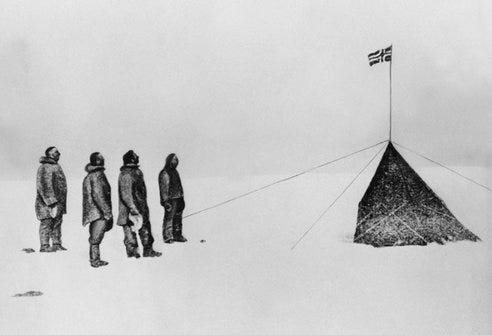5 lessons from the tragic race to the south pole
Patterns is a weekly idea or story for people who don’t want to hate Mondays.
If you are just now finding out about Patterns, you can subscribe here! If today’s idea inspired you to better enjoy your work, please forward this email to your friends or share it on social media! 🙏
When times get tough, the story of the race to the South Pole is a helpful example of how to work and the importance of pacing.
In 1910 there were two expeditions that set out to claim they’d been the first ever to visit the South Pole. Robert Falcon Scott set out to claim the honor for England. Roald Amundsen for Norway.

It’s a fascinating story given that we rarely have a head-to-head comparison with such similar to conditions to compare different approaches. A few differences in how they approached their expeditions:
Pace. Scott’s team would go for longer many days (9+ hours), but then not get out of their tents on hard days. Amundsen’s team went 5-6 hours, around 15 miles, every day no matter what.
Route. Scott’s team took the only route that was known. Amundsen took a new route.
Rest. Scott was impatient and didn’t like resting when it didn’t seem like you had to. Amundsen wanted his men to rest consistently, often 16 hours a day in their sleeping bags.
Transportation. Scott’s team brought 4 separate modes of transportation. The found that many didn’t work well, but adjusted. Amundsen chose dogs because of experience on a previous expedition.
Focus. Scott’s team was doing scientific discovery in addition to getting to the South Pole. Amundsen’s team was focused on one thing along: get to the pole. Scott kept much better records and photographs.
For those who don’t know the story, it might be tricky to tell which approach was better. Look over these again and think about what the outcome may be.
Here’s what resulted:
Amundsen got there first.
And tragically, Scott and his team not only lost the race, but did not survive the journey home.
There are more lessons to be learned about goal setting, preparation, and pacing from these two explorers and their teams (read more in these writeups).
Questions to consider this week:
Pace: How are you making progress, rain or shine, that gets you closer to your goals?
Route: What path are you taking and are you prepared? Is there another way to go?
Rest: Are you burning yourself out in the name of progress?
Transportation: Are you clear about the vehicle that will get you where you want to go?
Focus: Are you focused on the right things or is something a distraction?



